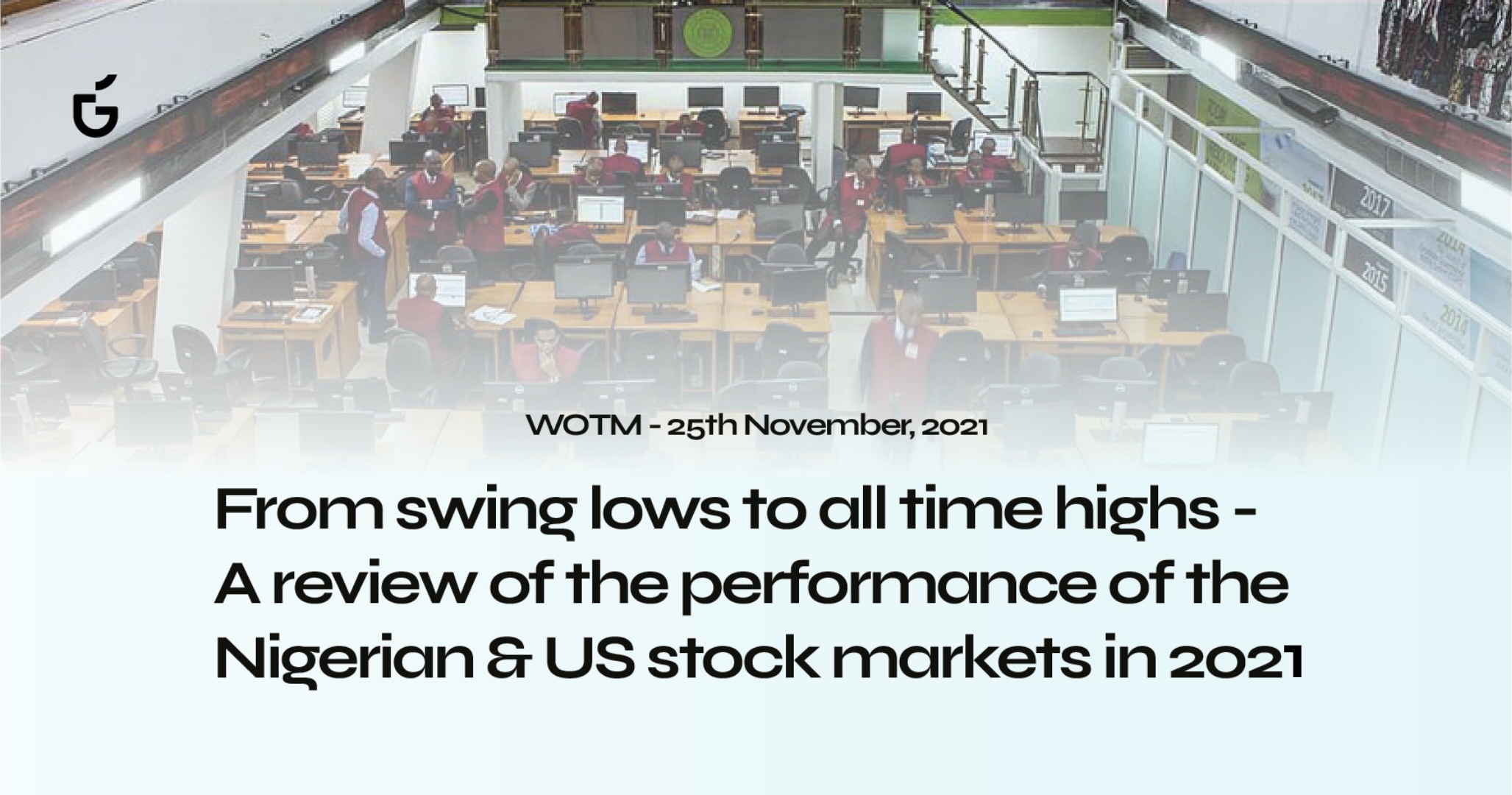 Africa
AfricaUnderstanding how companies are valued – A look into the MainOne acquisition
15 December, 2021
18 November, 2021 | 4 MINS READ
The Story
The International Monetary Fund (IMF) in October 2021, projected a 2.7% growth for the Nigerian economy in 2022. This projection was made based on expected gains from higher oil prices and the recovery of the non-oil sector from the woes of the pandemic.
2022 is a Pre-election year, is this Growth Projection Accurate?
To answer this question, let’s see what the trend has been in terms of economic growth in prior pre-election years
2010/2011
Coming out of the global financial crisis of 2008/2009, the year 2010 was a year of recovery for the Nigerian economy. Oil prices were 20% higher ($79.6) than they were in 2009, oil output per day was 2.6million barrels given the amnesty program in the Niger-delta region, the exchange rate was stable with Naira trading at an average of N150/$, and inflation remained as an average of 12%. All of these contributed to the 7.9% Gross Domestic Product (GDP) growth in the period.
Despite it being a pre-election year, the Nigerian Stock Exchange rose by 18.9% in the period reflecting the state of the economy. Foreign exchange reserve in 2010 however dipped by 24% to $32bn despite the 20% rise in oil prices in 2010. Higher oil prices provided the means to maintain liquidity in the foreign exchange market and still fund election spendings in the period as the incumbent was seeking re-election.
Economic growth slowed a bit in 2011. GDP growth fell to 7.4% from 7.9% in 2010 and oil production reduced to 2.4million barrels per day. Though oil prices stayed above $100 in 2011, the foreign exchange reserve remained flat, growing by a meagre 1.75% to $32.9billion. The exchange rate fell to N160/$ by the end of the year, while the stock market lost 16.3%. The Nigerian government’s inability to translate high oil prices to the growth of its foreign exchange reserve became the bane of the economy in 2014/2015.
2014/2015
The year 2014 started with a lot of optimism for the Nigerian economy. In January 2014, Nigeria was named a part of the MINT (Mexico, Indonesia, Nigeria & Turkey) countries. These countries were expected to form part of the world’s biggest economies by the year 2050. By April 2014, the Nigerian economy became the largest economy in Africa after the rebasing of its GDP (adjustment of the metrics used in the calculation of GDP to reflect current prices of goods & services and the growth of new sectors).
This was also the year oil prices started to dip. Unlike 2010 when earnings from crude oil sales were enough to fund the country’s foreign exchange needs and election spendings, foreign exchange earnings in 2014 weren’t as buoyant and there weren’t enough foreign exchange savings to fall back on.
Oil prices fell below $100, falling by 49%, the country’s foreign exchange reserve stood at $34billion at the end of the year. Oil production per day dropped to 2.25million barrels, while the stock market lost 16% as foreign investors vacated the market.
In September 2013, the Central Bank of Nigeria (CBN) then headed by Sanusi Lamido, announced that it suspected early political campaigning was spurring increasing foreign exchange demand. In a direct quote, the CBN governor said “We have seen evidence of huge demand for dollars by bureau de changes, huge purchases of cash that are not accounted for. It is a small class of people that has access to huge rents.” Sanusi Lamido was suspended from office in February 2014 after he revealed $20bn wasn’t remitted by the Nigerian National Petroleum Corporation (NNPC) for over 18months.
At the beginning of 2014, the Naira was exchanging for N164/$, by the end of the year, it was at N184/$.
The Naira stated 2015 at N190/$. With oil prices below $50 and the date of the general election set for the end of March 2015, the decline of Nigeria’s foreign exchange reserve continued into Q1 2015. In a bid to retain the power of incumbency, the government spared no expense in election campaigning and so the country’s foreign exchange reserve fell to $29.3bn in March 2015. Inflation jumped to 15% in 2015 from 8% in 2014 and the stock exchange remained negative, losing 17% in 2015.
By 2016, the Nigerian economy was in a recession.
2018/2019
2018 was another year of economic recovery for the Nigerian economy after 5 consecutive quarters of a recession. Oil prices started an upward trajectory in 2017, the CBN was able to turn around the economic woes that came with low foreign earnings from oil by maintaining liquidity in the foreign exchange market. The CBN created the Investor’s and Exporter’s window (I & E window). With this, the exchange rate remained stable at N360/$ from 2017 to 2019.
GDP grew by 1.9% and inflation slowed to 12% from a high of 17% in 2017. The stock market however couldn’t maintain the gains of 2017 as it fell from 42% at the end of 2017 to -17% by the end of 2018. This came mainly on the back of the withdrawal of Foreign Portfolio Investors (FPIs) from the market in the period. FPIs in response to the political intrigues ahead of the elections moved funds from the market.
The CBN fought tooth & nail to maintain the liquidity in the foreign exchange market despite demand pressures. The 2016 recession had made it glaring that the success of the Nigerian economy was reliant on the liquidity in the foreign exchange market. According to PriceWaterCoopers (PWC), the CBN’s injections into the FX market rose by 87% to $40bn in 2018. The CBN’s determination to defend the value of the Naira despite increased demand for the dollar accounts for the significant rise in FX injections in 2018. The foreign reserve was $43bn at the end of 2018.
Economic growth remained stable in 2019, as GDP grew by 2.2% in the period. The rise in oil prices however started to wane by the end of 2019 and again the Nigerian economy began to unravel. The Naira depreciated to N381/$ in the parallel market by the end of the year. Oil prices in 2019 were lower than they were in 2018, we saw oil prices drop below $60 per barrel in the last quarter of 2019. Nigeria’s foreign reserve stood at $39bn at the end of 2019 and the stock market lost 14.6%.
What to expect in 2022/2023
2022/2023 has similar traits with 2014/2015. The incumbent isn’t seeking re-election; it’s looking to retain its political party in power. Based on this, we do not expect things to be any different (in terms of demand for FX and reserve management) than they were in 2014/2015.
The economy has already been battered by the pandemic. Oil earnings are low and foreign exchange scarcity heightened in Q3 2021. The foreign reserve as at the time of writing is at $41.3bn.
Oil prices have recovered from the lows of 2020. They are presently above $70. Expectations are that they’ll remain above $60 at least till the second quarter of 2022. Nigeria at the end of Q3 2021, issued a Eurobond through which it has received an inflow of $4billion. This together with earnings from crude oil sales and concessionary loans from the world bank has returned liquidity to the foreign exchange market. The exchange rate at the parallel market has improved from N570/$ in October 2021 to N540/$ as of the middle of November 2021.
Though inflation has been increasing at a decreasing rate, food inflation remains high at 18% as of October 2021. Lower year on year inflation will be retained as long as the Central Bank of Nigeria (CBN) is able to maintain the liquidity of the foreign exchange.
The direction of the Nigerian economy in 2022, is very much tied to the CBN’s ability to maintain liquidity in the FX market. The recent influx of foreign exchange is a short-term fix to the foreign exchange liquidity problem. Besides, expectations are that interest rate on dollar assets will rise in 2022, given the US Fed’s stop of its bond-buying program. This implies, Nigeria will have to offer investors a higher rate of return on its debt instruments if it’s to borrow in foreign exchange in 2022.
How do I invest in the coming election season?
Election seasons in Nigeria usually come with political and economic uncertainties. Investors can protect their portfolios by divesting from sectors that are most vulnerable to FX fluctuations (oil & gas, manufacturing and other import-dependent sectors) and invest a proportion of their portfolio in currencies more stable than the Naira.
The political and economic uncertainties would also require that investors maintain a reasonable level of liquidity in their portfolios. Investors can take advantage of money market instruments to grow emergency funds.
To learn more about how to invest in 2022, plan to attend our annual event, TGIx – Open Investment Conversations and Networking. It will hold on the 23rd of January 2022 at the Civic Center Victoria Island, Lagos.
 Africa
Africa15 December, 2021
 Africa
Africa09 December, 2021
Join the biggest
investment club in Nigeria.